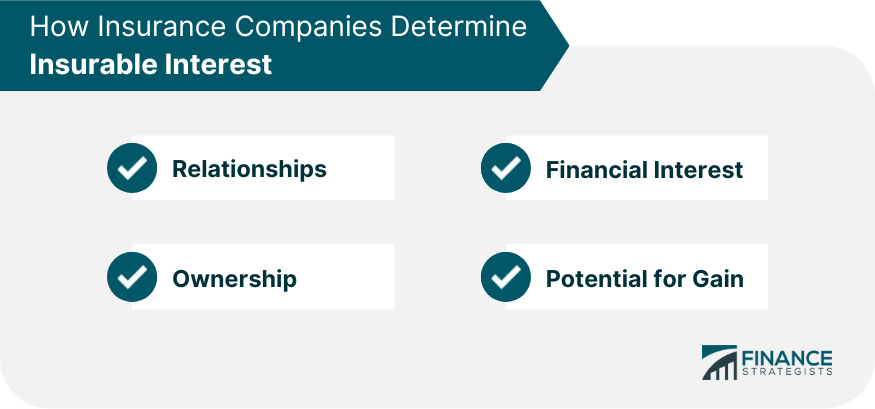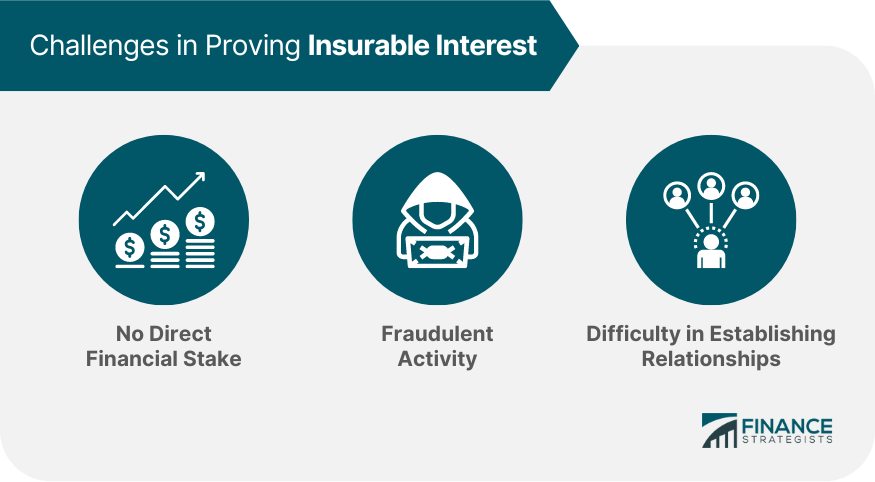Insurable interest refers to a financial stake that a person has in a particular event or item that is covered by an insurance policy, meaning that the policyholder will suffer a financial loss if the event insured against occurs. It is an essential aspect of insurance because it helps to protect insurance policies from being misused for financial gain. For example, if a homeowner insures their property against fire, they have an insurable interest in their property because they will suffer a financial loss if their property is damaged by fire. If the homeowner did not have an insurable interest in the property, they could theoretically burn it down and collect the insurance payout, which would be fraudulent. Insurable interest is required at the time of policy issuance and must be maintained throughout the policy period. Without insurable interest, the insurance policy is void and unenforceable. It is important to note that insurable interest applies to both property and life insurance policies. Insurance companies must determine whether an insurable interest exists before issuing a policy. This process helps ensure that the policy is not being obtained for fraud. Insurance companies will typically consider the following factors when determining insurable interest: In most cases, the policyholder must have a direct relationship with the insured item or event. For instance, a homeowner has an insurable interest in their home because they have a financial stake in it. Similarly, a business owner has an insurable interest in their company because they have invested time, money, and effort into its operation. In some cases, the relationship between the policyholder and the insured item may be more indirect. For example, a landlord may have an insurable interest in their rental property if they have invested in renovations and repairs. The tenant may also have an insurable interest if they have personal property on the premises. Insurance companies will assess the relationship in these situations to determine whether a financial stake exists. Generally, the policyholder must have a direct financial stake in the item or event being insured. For example, a lender has an insurable interest in a property they mortgage because they stand to lose money if the property is damaged or destroyed. Likewise, a company owner has an insurable interest in their business property because it is essential for their operations. If the property is damaged or destroyed, the business owner may suffer a financial loss. In cases where there is no direct financial stake, insurance companies may question the policyholder's insurable interest and may require further proof of the stake. The policyholder must have a legal ownership interest in the insured item or event. For example, if a person owns a car, they have an insurable interest in it. If the car is damaged or destroyed, the owner will suffer a financial loss. In some cases, ownership may be more complex. For example, a joint property owner may have an insurable interest, even if they do not have sole ownership. If the policyholder stands to benefit financially from the event insured against, they may not have an insurable interest. For example, a person may not have an insurable interest in the life of someone they do not know if they stand to benefit financially from their death. In this case, insurable interest refers to the policyholder's financial stake in the insured property. The policyholder must have a direct relationship with the property and must stand to suffer a financial loss if the property is damaged or destroyed. This financial stake may arise from ownership, mortgage, lease, or business interests. Demonstrating property insurable interest may involve providing documentation that shows ownership, such as a deed or title. If the property is mortgaged, the lender may have an insurable interest, and the policyholder may need to provide proof of the mortgage agreement. Sometimes, tenants may also have an insurable interest. If they have made improvements or have personal property on the premises, tenants may have a financial stake in the property's well-being. In such cases, tenants may need to provide documentation, such as receipts for improvements made to the property or an inventory of personal property. Company owners may also have an insurable interest in their business property. In this case, the policyholder must provide evidence that the property is essential for the operation of the business. This process may involve proving the property's importance by presenting financial statements or business plans. The policyholder must have a direct financial stake in the insured person's well-being, such as a familial relationship, financial interest, or a legal obligation to support them. For example, a spouse may depend on their partner's income to support their family, and as a result, they have an insurable interest in their partner's life. Business partners may have an insurable interest in each other's lives because they depend on the other's skills and abilities to operate their business. To demonstrate insurable interest, the policyholder must provide evidence that they have a financial stake in the insured person's life. In most cases, this involves proving the financial relationship between the policyholder and the insured person. For example, if the policyholder is a spouse, they may need to provide evidence showing their financial dependence on their partner. It may involve furnishing copies of tax returns or bank statements that show joint accounts or shared expenses. In the case of a business partner, they may need to show the importance of the insured person's skills and abilities to the operation of the business. It may involve providing financial statements or business plans that show the insured person's importance to the business. In other cases, the policyholder may need to demonstrate their financial stake through a legal obligation to support the insured person. For example, a court may order one spouse to provide financial support to the other spouse, and as a result, the supporting spouse has an insurable interest in their partner's life. An excellent instance of insurable interest in action is life insurance policies taken out by businesses on their key employees, those whose skills, knowledge, or experience are essential to the operation of the business. If a key employee were to die, the business could suffer a severe financial loss, and the owner may need to find a replacement. To protect against this risk, businesses may take out life insurance policies on key employees. This policy type is also called dead-peasant insurance. The business owner would be the policyholder, and the key employee would be the insured person. In this case, the company owner has an insurable interest because the key employee's death would cause significant financial harm to the business. In certain cases, insurance companies may require additional evidence to prove that the policyholder has a genuine financial stake in the item or event insured. A person may attempt to obtain an insurance policy on a property that they do not own or have any legal or financial interest in. Insurance companies will question the policyholder's insurable interest in such cases. They may need to verify through legal or formal evidence that the policyholder has a genuine financial stake in the property. They may ask a policyholder to show a lease or rental agreement, proof of investment in the property, or proof of personal property on the premises. Sometimes, policyholders may provide false information to the insurance company to obtain a policy. For example, a person may attempt to obtain a life insurance policy on a stranger's life for financial gain. Insurance companies have measures in place to prevent such fraudulent activities. They may require witnesses to corroborate that the policyholder has a genuine financial stake in the insured item or event. Insurance companies may also conduct investigations to verify the information provided by the policyholder. To prove insurable interest in such cases, policyholders may need to demonstrate the nature of the relationship between themselves and the insured person. This process may involve submitting evidence of shared expenses, like medical bills or joint mortgage contracts. A policyholder may also furnish the insurance company records of business ownership stakes. Insurable interest refers to a financial stake that a person has in a particular event or item that is covered by an insurance policy. Insurable interest protects insurance policies from being misused for financial gain. Insurance companies determine insurable interest by considering various factors such as relationships, financial interest, ownership, and the potential for gain. Insurance companies must assess insurable interest before issuing a policy to prevent fraud. In property insurance, demonstrating insurable interest may involve providing documentation that shows ownership, mortgage, or business interests. Similarly, in life insurance, policyholders must demonstrate the financial relationship between themselves and the insured person. Proving insurable interest can be challenging in some situations, such as when the policyholder has no direct financial stake, engages in fraudulent activity, or has difficulty establishing a financial relationship. In such cases, policyholders may need to provide additional documentation or evidence to prove their insurable interest. Maintaining insurable interest throughout the policy period is crucial because, without it, the insurance policy is void and unenforceable. Consult a certified financial advisor for further guidance regarding insurable interest and other insurance matters.What Is Insurable Interest?
How Insurance Companies Determine Insurable Interest
Relationships
Financial Interest
Ownership
Potential for Gain

Property Insurable Interest
Life Insurable Interest
Real-World Example of Insurable Interest
Challenges in Proving Insurable Interest
No Direct Financial Stake
Fraudulent Activity
Difficulty in Establishing Relationships

Final Thoughts
Insurable Interest FAQs
It refers to a financial stake that a person has in a particular event or item that is covered by an insurance policy, meaning that the policyholder will suffer a financial loss if the event insured against occurs.
In life insurance, insurable interest requires the policyholder to have a direct financial stake in the insured person's well-being, such as a familial relationship, financial interest, or a legal obligation to support them.
In property insurance, insurable interest works by requiring the policyholder to have a direct relationship with the property and must stand to suffer a financial loss if the property is damaged or destroyed. This financial stake may arise from ownership, mortgage, lease, or business interests.
Insurable interest can be demonstrated by providing documentation that shows ownership, financial interest, or relationship with the insured person or property, including deeds or titles, tax returns, bank statements, and joint accounts.
Insurable interest applies to both property and life insurance policies. It is required at the time of policy issuance and must be maintained throughout the policy period. The policyholder must have a genuine financial stake in the insured item or event to prevent fraudulent activities.
True Tamplin is a published author, public speaker, CEO of UpDigital, and founder of Finance Strategists.
True is a Certified Educator in Personal Finance (CEPF®), author of The Handy Financial Ratios Guide, a member of the Society for Advancing Business Editing and Writing, contributes to his financial education site, Finance Strategists, and has spoken to various financial communities such as the CFA Institute, as well as university students like his Alma mater, Biola University, where he received a bachelor of science in business and data analytics.
To learn more about True, visit his personal website or view his author profiles on Amazon, Nasdaq and Forbes.















